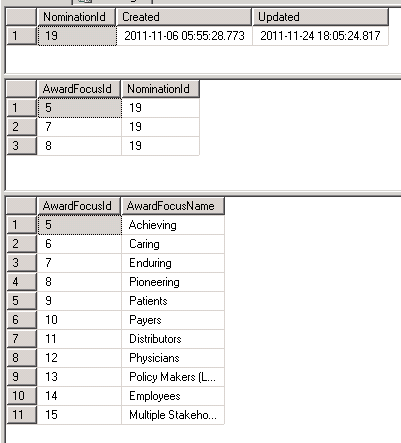Monday, 20 April 2015
Thursday, 16 April 2015
sql server sub query with a comma separated resultset
I have above table structure and if i want to show my child table's value comma separated then below is my solution.
SELECT n.nominationID
, SUBSTRING((
SELECT ',' + af.awardFocusName
FROM NominationAwardFocus naf
JOIN AwardFocus af
ON naf.awardFocusID = af.awardFocusID
WHERE n.nominationID = naf.nominationID
FOR XML PATH('')
), 2, 1000000)
FROM Nomination n
And another solutions is
DECLARE @listStr VARCHAR(MAX)
(SELECT @listStr = COALESCE(@listStr+',' , '') + c.Code FROM RefferalCPTCodes r inner join CPTCode c on r.CPTCodeID=c.id where ReferralID=80)
SELECT @listStr
Monday, 30 March 2015
AngularJS validation of two forms on same page
I have two forms on the same page that need validation. The thing is one of the forms is being databound so that I can check if it is valid using $invalid. But the other form seems like it is not getting bound and cannot call any of the methods on it ($dirty, $invalid, etc.)
Please see here below
replace
<div class="error" data-ng-show="checkoutBillingForm.txtBillingAddress1.$dirty && checkoutBillingForm.txtBillingAddress1.$invalid">
with
<div class="error" data-ng-show="checkoutBillingForm.txtBillingAddress1.$dirty || checkoutBillingForm.txtBillingAddress1.$invalid">var app = angular.module('app', []);<script src="https://ajax.googleapis.com/ajax/libs/angularjs/1.2.23/angular.min.js"></script>
<div ng-app="app">
<form name="checkoutShippingForm" role="form" novalidate="">
<div class="row">
<div class="col-md-4">
<label for="txtAddress1">Address 1:</label>
</div>
<div class="col-md-8">
<input type="text" name="txtAddress1" data-ng-model="vm.Shipping.Address.AddressLine1" required="" />
<div class="error" data-ng-show="checkoutShippingForm.txtAddress1.$dirty && checkoutShippingForm.txtAddress1.$invalid">
<small class="error" data-ng-show="checkoutShippingForm.txtAddress1.$error.required">An Address is required.</small>
</div>
</div>
</div>
Invalid? {{checkoutShippingForm.$invalid}}
<!--Doesn't show -->
</form>
<form name="checkoutBillingForm" role="form" novalidate="">
<div class="row">
<div class="col-md-4">
<label for="txtBillingAddress1">Billing Address 1:</label>
</div>
<div class="col-md-8">
<input type="text" id="txtBillingAddress1" name="txtBillingAddress1" data-ng-model="vm.Billing.Address.AddressLine1" required="" />
<div class="error" data-ng-show="checkoutBillingForm.txtBillingAddress1.$dirty || checkoutBillingForm.txtBillingAddress1.$invalid">
<small class="error" data-ng-show="checkoutBillingForm.txtBillingAddress1.$error.required">An Address is required.</small>
</div>
</div>
</div>
</form>
</div>Thursday, 22 January 2015
Check whether one list contain another list value in LINQ
var CheckExist = List1.Any(l1 => List2.Any(l2 => l1.Name == l2.Name));
Here CheckExist object will return true if any record of List1 contain in List2
Sunday, 28 December 2014
Formatting date in Linq-to-Entities query causes exception
invoices.Select(i => new
{
FormattedDate = ( EntityFunctions.Right(String.Concat(" ", SqlFunctions.StringConvert((double?) SqlFunctions.DatePart("dd", i.DocumentDate))), 2)
+ "/"
+ EntityFunctions.Right(String.Concat(" ",SqlFunctions.StringConvert((double?) SqlFunctions.DatePart("mm", i.DocumentDate))), 2)
+ "/"
+ EntityFunctions.Right(SqlFunctions.StringConvert((double?) SqlFunctions.DatePart("yyyy", i.DocumentDate)), 4)
).Replace(" ", "0")
}Friday, 27 June 2014
Convert returned JSON Object Properties to (lower first) camelCase
I have JSON returned from an API like so:
Contacts: [{ GivenName: "Matt", FamilyName:"Berry" }]
To keep this consitent with my code style (camelCase - lower case first letter) I want to transform the array to produce the following:
contacts: [{ givenName: "Matt", familyName:"Berry" }]
Whats the easiest/best way to do this? create a new Contact object and iterate over all the conatacts in the returned array?
I needed a generic method that accepted an array or object. This is what I'm using (I borrowed KyorCode's
firstToLower() implementation):
function convertKeysToCamelCase(obj) {
if (!obj || typeof obj !== "object") return null;
if (obj instanceof Array) {
return $.map(obj, function(value) {
return convertKeysToCamelCase(value);
});
}
var newObj = {};
$.each(obj, function(key, value) {
key = key.charAt(0).toLowerCase() + key.slice(1);
newObj[key] = value;
});
return newObj;
};
Example calls:
var contact = { GivenName: "Matt", FamilyName:"Berry" };
console.log(convertKeysToCamelCase(contact));
// logs: Object { givenName="Matt", familyName="Berry"}
console.log(convertKeysToCamelCase([contact]));
// logs: [Object { givenName="Matt", familyName="Berry"}]
console.log(convertKeysToCamelCase("string"));
// logs: null
console.log(contact);
// logs: Object { GivenName="Matt", FamilyName="Berry"}
Subscribe to:
Posts (Atom)
